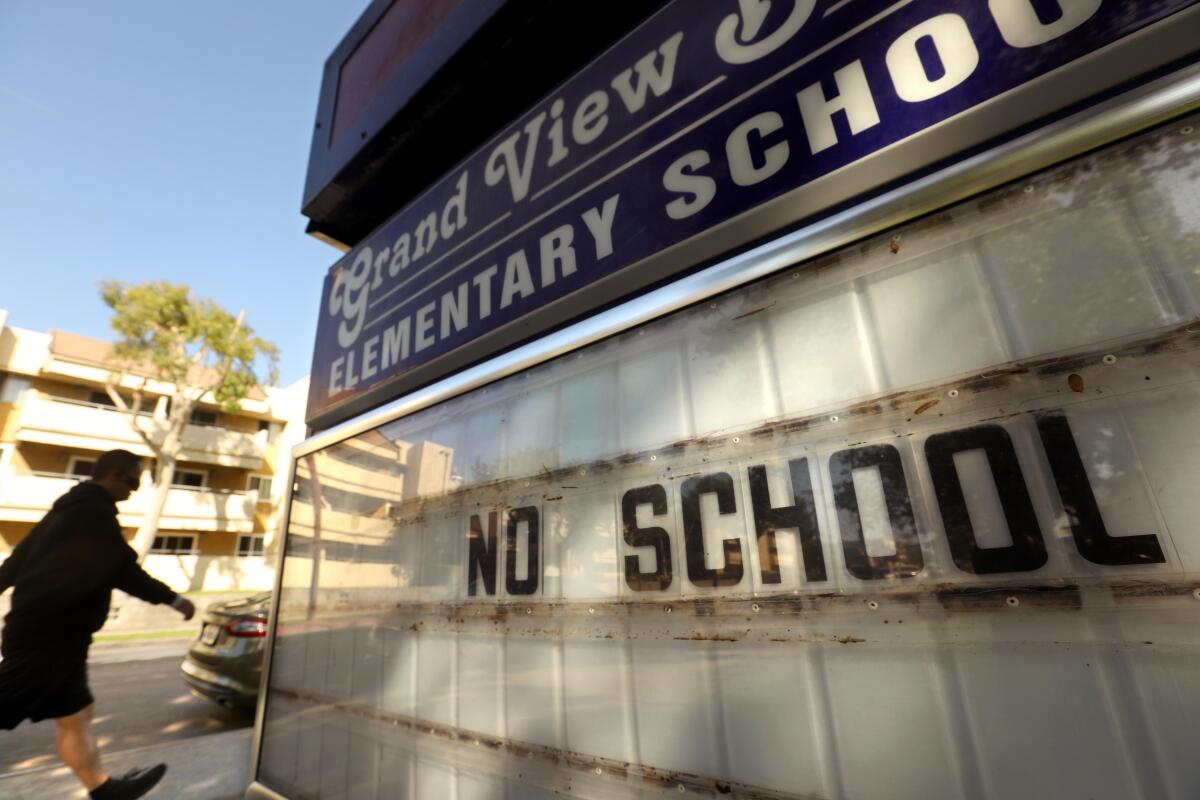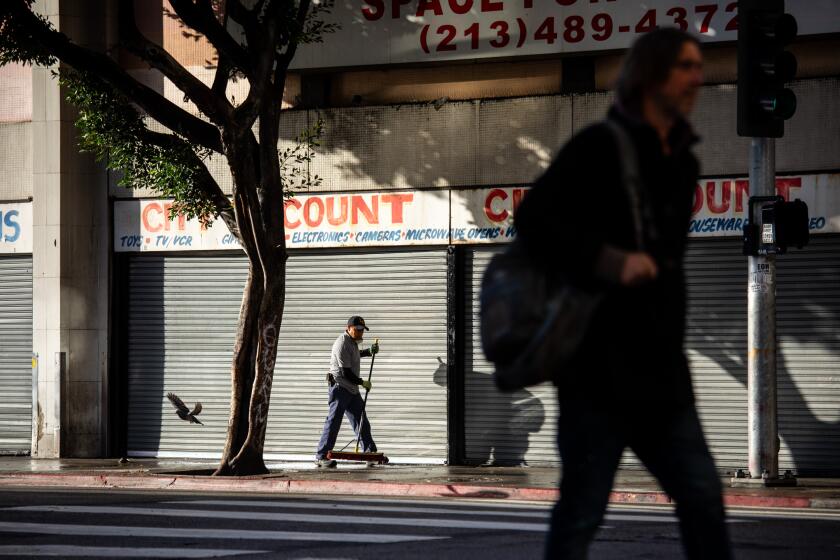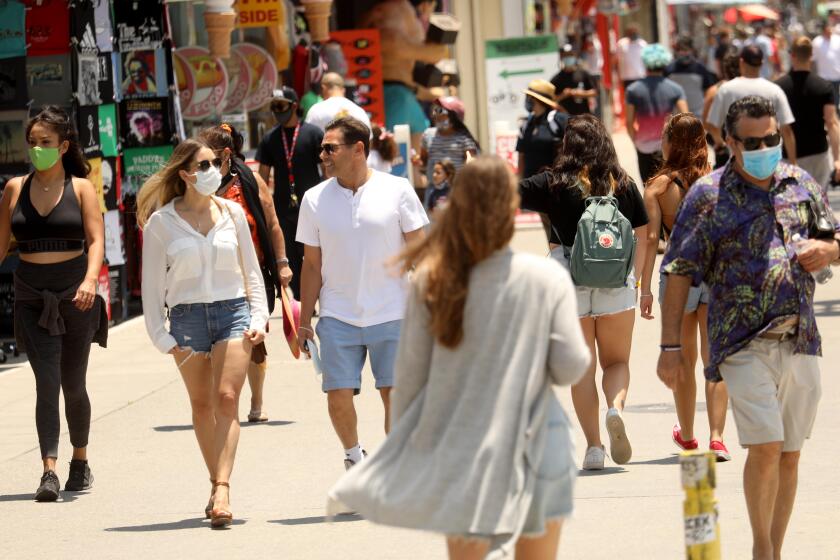Newsletter: Is your child’s school shut down? You may be eligible for unemployment

- Share via
Good morning. I’m Rachel Schnalzer, the L.A. Times Business section’s audience engagement editor, with our weekly newsletter about how you and your bank account can weather the COVID-19 pandemic and prepare for whatever the economy might look like on the other side.
For the record:
7:46 a.m. July 23, 2020This newsletter says Pandemic Unemployment Assistance benefits are supposed to end at the end of this month. In fact, that federal program — providing unemployment benefits for the self-employed and others not eligible for the regular state Unemployment Insurance program — lasts through Dec. 26. Pandemic Additional Compensation, the additional $600 federal stimulus payment automatically added to each week of unemployment benefits, is what ends July 25.
Last Friday, The Times reported that most California schools will not reopen for in-person classes this fall because of the current surge in coronavirus infections. This creates a tough spot for parents who work outside the home and have kids who need adult supervision. Those who can’t find an affordable child-care provider might end up having to cut their work hours or even quit their jobs.
The good news: In California, it’s possible to receive unemployment benefits if you need to stay home with your child because of a school’s switch to online teaching. But there are a few things you should keep in mind.
Can every parent in this situation get benefits?
No. California’s Employment Development Department reviews unemployment claims on a case-by-case basis, and various factors can make the applicant ineligible.
“For example, there may be someone else in the home who can care for the child,” explained Tia Koonse, legal and policy research manager at the UCLA Labor Center. You also probably can’t get benefits if you could have stayed home with your child while remaining employed, Koonse added: “Your employer may be willing to revise your schedule or let you telework.”
Can you get benefits without giving up your job?
It’s possible! If you’ve had to reduce your work hours as a result of your child-care needs, you may be eligible to receive reduced unemployment benefits. “If your employer is willing to give you a reduced or modified schedule so that you can take care of your kid, you should apply for [unemployment insurance benefits] for those hours that are reduced,” Koonse said.
Here’s how to file for unemployment benefits if you’ve lost work because of the coronavirus outbreak. Read this explainer for eligibility requirements and how the program works.
What sort of documentation should you prepare?
After you apply for unemployment benefits, the EDD will contact you and your employer to sort out whether you’re eligible. The call will go more smoothly if you already have gathered documentation to support your claim.
At a minimum, said Meagan Garland, an employment lawyer at Duane Morris in San Diego, you’re “probably going to need to provide the name of the school.”
It’s also helpful to have documentation showing that you’re a custodial parent and, if possible, showing that you’re the only household member who can care for the child, Koonse added. “The more evidence you have that you’re the first runner-up for your kiddo, the easier it’s going to be on the representative to approve your benefits.”
How much money would you get?
Regular unemployment insurance benefits range from $40 to $450 per week, according to the EDD. If you’re not getting a paycheck at all, you could potentially receive payments for 13 to 26 weeks, an EDD spokesperson said in an email. If you’re earning some income and getting only partial unemployment benefits, you could be eligible for more weeks.
The EDD’s unemployment insurance calculator can help you estimate how much in benefits you might receive.
Would the money show up right away?
Almost certainly not. An EDD spokeswoman said last month that most claims are processed within three weeks, but some take much longer. The agency has been inundated with unemployment claims since pandemic-induced business closures began in the spring, and some people are waiting months between applying for unemployment benefits and seeing results.
And if you want to call the agency to check on your application’s status or try to resolve problems with your claim, good luck. My colleagues Maria L. La Ganga and Patrick McGreevy report that the EDD phone lines are so overwhelmed, Californians are redialing hundreds of times in a row before they get through.
Are there risks associated with quitting your job as a result of your child-care needs?
Unfortunately, yes. “If you quit your job, there’s no guarantee you’re going to get it back. And there’s no guarantee, if you do get it back, that you’ll get your seniority,” Koonse explained.
However, if you’re concerned about having a gap in your employment history, you shouldn’t worry too much. “If there was ever a time in life when employers were less concerned than ever they were before about the reasons for the gap in your resume, it’s now.... Everybody has suffered as a result of the pandemic,” Garland said. “This is a strange time.”
There might already be money for you to claim.
Did you lose work in the spring as a result of your child’s school closure? If you haven’t applied for unemployment benefits for lost income, it’s not too late. However, it’s crucial to file for these benefits before the end of the month.
“It’s especially important for people to get that in before the end of July, because Pandemic Unemployment Assistance benefits are supposed to end at the end of this month, and you want to make sure that you will be able to receive whatever PUA you were supposed to receive [in the spring],” Koonse said.
Consider subscribing to the Los Angeles Times
Your support helps us deliver the news that matters most. Become a subscriber.
Other stories you may find helpful
◆ California gained 558,200 jobs from mid-May to mid-June. However, these numbers don’t account for the resurgence of COVID-19 throughout the U.S. in the last half of June or the backtracked reopening of the economy, writes Russ Mitchell.
◆ Car insurers gave everyone a pandemic discount. Now some are raising rates, writes columnist David Lazarus. He explores whether insurers will continue to offer discounts to those who are driving less as a result of the coronavirus.
◆ Gig-economy jobs can make a big difference in your life — if you’re strategic about them. Kathy Kristof spoke with an independent contractor who was able to match his day job’s salary with gig work. He shares his nine strategies for using side hustles to change your life.
◆ The Black housing crisis is getting worse, writes Andrew Khouri. He explains how racism has contributed to the housing insecurities we see today, which are currently exacerbated by the pandemic.
◆ “President Trump can’t seem to get the stupid idea of a payroll tax cut out of his head,” writes columnist Michael Hiltzik. He explains why a payroll tax cut “would do nothing to help Americans who need the most help.”
◆ Are you eligible for food stamps? Ron Leiber of the New York Times explains how you can find out.
◆ Do you receive different credit scores from your bank and card companies? Certified financial planner Liz Weston outlines how companies may use different credit scoring formulas or different credit bureaus to come up with your score.
Reader question
A reader wrote: I work in a convenience store as a cashier. Am I required to wear a mask all the time, even if there are no customers?
My colleague Taylor Avery researched this and found that the answer is yes, according to the California Department of Public Health, Cal/OSHA and the County of Los Angeles Department of Public Health.
For anyone in California engaged in work, face coverings are required when a worker is in “any space visited by members of the public, regardless of whether anyone from the public is present at the time,” according to the state’s COVID-19 industry guidance for retail businesses.
In L.A. County, retail workers must wear a face covering when they are in contact with others or are likely to be. The only exception is when a worker is “alone in a private office or a walled cubicle,” the county Department of Public Health’s guidance for retailers says.
There’s good reason for this. This month, the World Health Organization confirmed that it’s a possibility that tiny droplets containing the coronavirus can stay in the air for hours, potentially leading to airborne transmission.
And as the virus continues to quickly spread — on Monday, more than 10,000 new cases were reported in California — a mask can offer you some protection.
Another good reason to wear a mask: Your employer could fire you if you refuse.
“Employers have the right to design the workplace safety protocols and set the workplace dress code, as long as they do not engage in unlawful discrimination. So employers can certainly require masks in the workplace,” said Matthew Clark, an employment law attorney at the Legal Aid Foundation of Los Angeles. “Most employment in California is at-will, so an employer can fire an employee for any reason, including refusal to wear a mask.”
If a worker can’t wear a mask because of medical reasons, Clark says, they can request an accommodation from their employer.
Masks do not reduce blood oxygen levels or increase carbon dioxide levels, a UC San Francisco infectious disease specialist says.
Have a question about work, business or finances during the COVID-19 pandemic, or tips for coping that you’d like to share? Send us an email at californiainc@latimes.com, and we may include it in a future newsletter.
One more thing
No one knows what the new school year will look like for incoming college students. With the fall semester only a month away for many schools, it’s still unclear how colleges will be able to open safely. Lisa Boone spoke with experts about six pressing questions posed to us from parents of college students. Hopefully the answers will help you, too — or the parent of a college student you know.
Inside the business of entertainment
The Wide Shot brings you news, analysis and insights on everything from streaming wars to production — and what it all means for the future.
You may occasionally receive promotional content from the Los Angeles Times.







